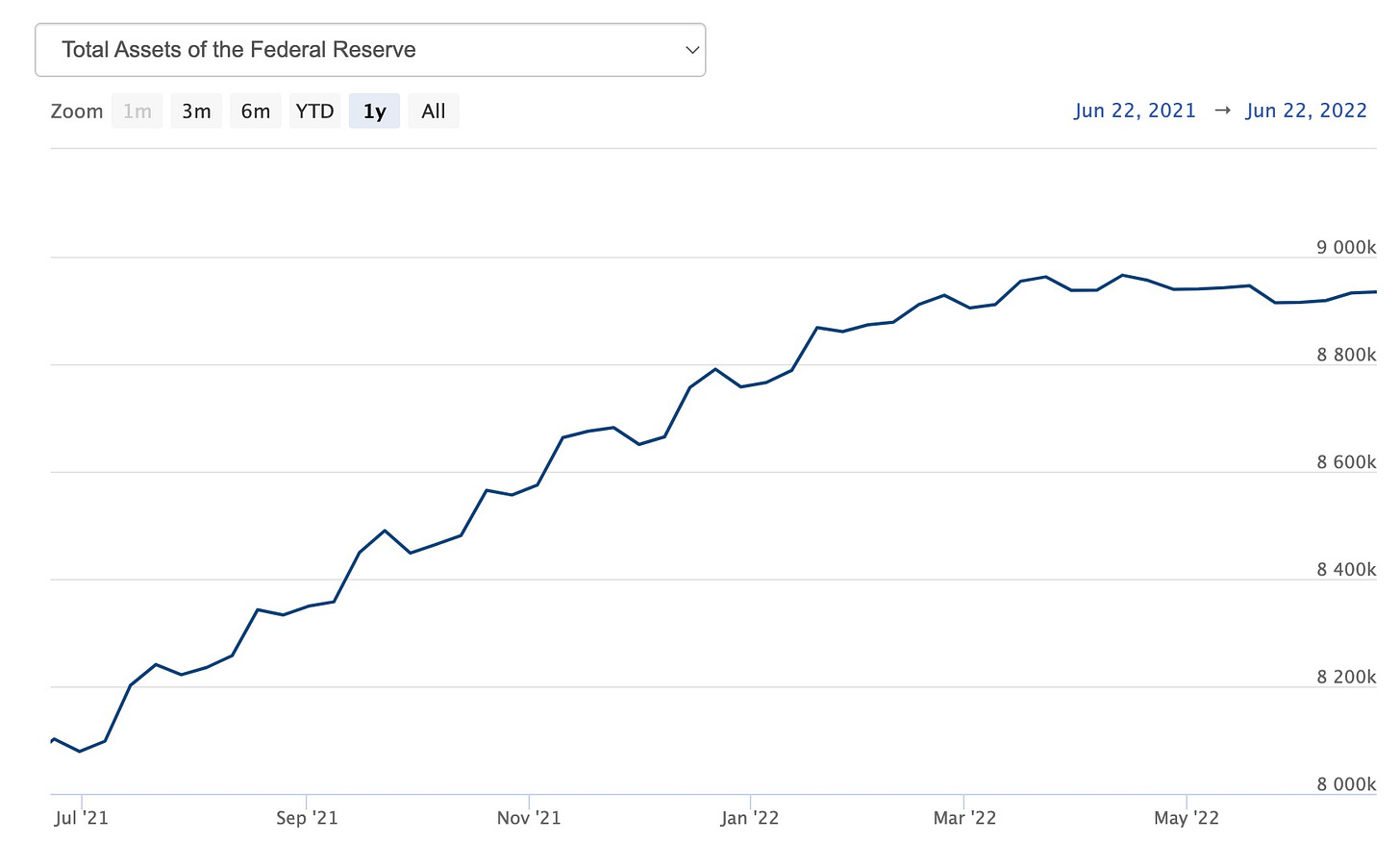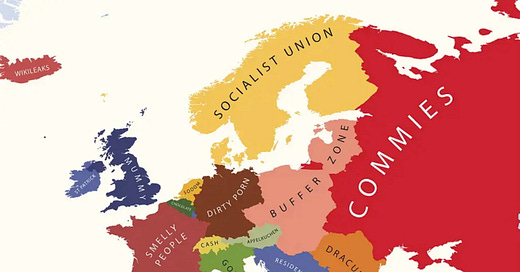Biden Puts Europe First and America Last (Finance Friday)
Dead-cat bounce passes and Taiwan may not be Beijing’s first target
Joe Biden used his latest foreign trip to the summits of the obsolete G7 grouping of governments and moocher NATO alliance to criticize American democracy and advance his de facto “Europe First” foreign policy. Meeting with his fellow neoliberal globalists, our dotard president called the U.S. Supreme Court, which recently affirmed the plain and obvious language of the Constitution, “destabilizing,” and falsely blamed Russian President Vladimir Putin for the inflation that he and his fellow globalists have caused.
Putting Europe first, Joe Biden has prioritized relations with what he calls America’s “traditional allies” (i.e., his fellow white neoliberals) and reversed the policy of his predecessor, Donald Trump, to push Europe to spend just the modest amount it promised to spend on its own defense. At a meeting this week of NATO leaders, Joe Biden threw even more resources at the feckless, moocher bloc, which even without America is filthy rich with a combined economy of about $21 trillion and a population of 400 million.
Joe Biden also broke an explicit agreement with Russia not to station U.S. troops permanently in new NATO by announcing the permanent placement of U.S. forces in Poland. Where are all of the internationalists who moaned about unilaterally withdrawing from agreements when George W. Bush took the USA out of Kyoto and Trump left the Paris climate sham? Joe Biden is also sending destroyers to Spain (a very relevant place right up to its defeat in the Spanish-American War in 1898), state-of-the-art F-35 fighters to Britain and missile defense systems to Italy (another country where we inexplicably still have expensive bases where our forces stopped fighting in 1944).
Our adversaries like China and Iran look upon this foolishness and smile. For a fleeting moment after Joe Biden engineered humiliating failure in Afghanistan, it looked like a silver lining would be Washington shifting resources to the Pacific and ending nation-building and playing Cowboys and Indians in Middle Eastern backwaters. Instead, we could move to a deterrent force built on naval and air power in the Pacific and the Arabian Gulf. The Obama-Biden administration had talked up a necessary but make-believe “pivot” to Asia, later replaced with equally elusive “rebalancing.” Perhaps Joe Biden would finally make it so, aligning our sprawling defense apparatus with the actual threats we face today.
Evidently not. In Ukraine, to recycle what Omar Bradley said about the idea of expanding the Korean War into China, we are fighting “the wrong war, at the wrong place, at the wrong time, and with the wrong enemy.” It wasn’t enough for Joe Biden, every congressional Democrat, and the majority of congressional Republicans to send Ukraine $53 billion we don’t have. Now we are permanently bailing out rich Europeans who scorn us, expect us to pay for their defense, and screw us on trade.
Laughably, NATO for the first time implied concern with the threat posed by China. Everyone who does not have an advanced degree from the Harvard Kennedy School knows that NATO would be as irrelevant to a conflict with China as it has been to everything else since the Cold War ended in 1991—when NATO should have been dissolved. European countries would condemn China for initiating a war and some might even impose sanctions, but the only country that might truly join the war and commit military power is Britain, and that would likely be a minimal force, arriving months after the outbreak of hostilities. We’re meant to be cheering NATO’s great solidarity over Ukraine, but the world outside of the U.S. foreign policy establishment sees nothing but a mechanism to mooch resources from Americans.
Speaking of Ukraine, it is increasingly clear that Russia has the initiative and is winning the war, at least for now. Western analysts see Moscow’s recent capture of Severodonetsk and gradual consolidation in Donbas as the best Russia can do. Maybe, maybe not. Ukraine could turn the tide. Or Russia could continue to follow its historical norm in about half of its wars which begins with incompetence and failure, then leads to a gradual regrouping and shift to offense based on organized mass, and then suddenly becomes a juggernaut (e.g., World War II and the French invasion of Russia; the Soviet failure in Afghanistan and Russian failures in the Crimean War and Russo-Japanese War are exceptions.)
Whatever the future holds, Ukraine should be seeking peace now, ceding what Russia controls to preserve a more Ukrainian Ukraine. Instead, the corrupt authoritarian who runs Ukraine instructed his patrons at the G7 to end the war with total victory for Ukraine by the end of the year. For their part, the G7 leaders vowed to “support and stand with Ukraine for as long as it takes.” Apparently this was more encouraging to Ukraine’s dictator than former leaders of Afghanistan, Iraq, or South Vietnam, since he seems to have no intention of negotiating as his country is violently eroded from the east.
Joe Biden and the other G7 globalists didn’t mention inflation or the looming recessions about to rock Europe and the USA. This is ironic since the G7 was created not to egg on wars, but to solve financial problems. The grouping traces its origin to the aftermath of the collapse of Bretton Woods and other economic shocks of the early 1970s. Today, these leaders evidently couldn’t care less about inflation hurting their citizens—citizenship itself being an outdated construct to these men—and in fact they are dreaming up ways to make inflation worse with more demonstrably ineffective sanctions on Russian energy exports. This is a political order on thin ice.
Dead-Cat Bounce
Growth is down and inflation is up. For the second time, the Commerce Department cut its measurement of growth in the first quarter of this year. An advance estimate of -1.4% annualized change in GDP for the January-through-March quarter later became -1.5% and, as of this week, is now assessed to be -1.6%. Most economists think that growth returned in the second quarter, which ended yesterday and will be reported on July 28, but we have our doubts. Revisions usually indicate a trend and all of the components of GDP likely worsened during the second quarter. Only the intentional undercounting of inflation could stave off a technical recession, defined as two successive quarters of GDP decline.
The next big indicator of economic health will be on July 13 when the government reports on consumer prices (inflation) in June. You should be cautious of talk about inflation “peaking.” If you look at past inflationary periods, there is not a steady advance to a peak and then an orderly fallback to normal inflation. Rather, inflation readings themselves are highly volatile.
What this means is that the stock market likely has a long way to go before hitting bottom. Last week’s rally now looks like a dead-cat bounce within a persistent and ongoing bear market. Investors have not yet priced in the recession that is coming. They probably haven’t even priced in the full effects of tightening by the Federal Reserve. The market thinks it has the Fed’s schedule for raising interest rates figured out, but it has not grasped the implications of a shrinking money supply. The Fed has created more dollars out of thin air since 2018 than it created in the previous history of the Republic. Its quantitative easing (buying government debt and mortgages with newly created fiat money) beginning in 2020 made the loose money after the 2008 financial crisis look like child’s play. The easing also went on for at least a year-and-a-half too long. The consequences of unwinding this are unknown, and as the charts below indicate, only just beginning.


There is one silver lining. Democrats will bring down the price of oil the only way they know how: with a recession. Demand for oil is very inelastic, meaning small changes in supply or demand can move price dramatically. In 2008, oil peaked at $134 per barrel in June and would tank to $41 by December due to the financial crisis on onset of recession. Even without another Great Recession, solid declines in GDP looming in Europe and the USA may cause a rapid decline in the price of oil. This likelihood is one reason Joe Biden will likely get nothing more than chicken feed from Saudi Arabia when he pays homage to the Crown Prince there in mid-July. Oil exporters know all too well how quickly booms can turn to busts and do not want to expedite the arrival of one through big increases in production just as demand is evaporating.
Taiwan May Not Be Target One
While the 1941 Japanese attack on Pearl Harbor was a surprise, the advent of war in the Pacific was not. In fact, everyone who was paying attention to the theater knew that war was coming. The United States had an elaborate scheme called War Plan Orange that anticipated Japan would move against America’s jewel in the Pacific at the time, the Philippines. Imperial Japan did in fact invade the Philippines, but it attacked Pearl Harbor first and moved simultaneously against most European possessions in the region and was all the way down to the Solomon Islands in 1942. The point is that wars don’t always begin as analysts expect. There is a strong incentive for the aggressor to deviate from what is expected to throw his opponents off guard.
With the Chinese rooting around in the Solomons—a good place to cut Australia off from the world—and building bases as far away as the Horn of Africa, it’s worth asking whether Beijing would really commit its main effort to conquering Taiwan at the onset of a war, or whether the first significant blow would land elsewhere. Mark Simon and I touched upon the topic in the video podcast episode referenced below. It is a topic that deserves more consideration.
Pragmatic Australia
Australia’s new Labor prime minister, Anthony Albanese, has tasked the head of the Office of National Intelligence, Andrew Shearer, with producing a report that examines the security threat posed by climate change. This isn’t a surprise: climate change alarmism is the religion of the progressive Left, and adherents to this pagan religion (updated worship of the angry sun god from late antiquity and beyond) have long hoped and pretended their religion could pertain to national defense. Barack Obama’s Pacific Command boss, Samuel Locklear—a full admiral just like Rachel Levine—even named climate change as the most serious threat in his region, overlooking more plausible candidates like the Chinese, North Koreans, or jihadists in Southeast Asia.
What’s unusual is that Albanese tapped our friend Andrew Shearer for the job. Shearer served as top national security advisor to several conservative prime ministers and was elevated to intelligence boss by Albanese’s conservative predecessor. Does this signal pragmatism on the part of Albanese? Presumably Shearer will lead a sober process that will dutifully pretend climate change poses some national security challenge—refugee flows from droughts or fights over food and water are long-running favorites even if they never actually occur—but keep the make-believe under control and maybe even remind people that China is the world’s biggest polluter and of greater concern than cows farting methane.
Another possibility is that having decided to keep Shearer on in the important position—a rare act of non-partisanship by someone on the Left in the English-speaking world—Albanese nonetheless is availing himself of the chance to make Shearer take a bite from the shit sandwich and prove his loyalty.
Either way, we like what we see considering the alternatives, which would detract from real allied security.
Speaking of Oz, Mark Simon (Jimmy Lai’s deputy for 22 years) and I discussed a recent poll showing overwhelming support for Canberra’s decision to buy nuclear subs. (A separate poll just indicated Aussies would support defending Taiwan militarily if China attacks and the USA intervenes.) We also discussed what’s up with the Chicoms in the Solomon Islands. I’ve enclosed video and part of the transcript below. We also covered the dead-cat bounce in the markets, how to improve CNBC ratings, and the latest woke nonsense from corporate America. Take a look and subscribe to our video podcast on YouTube or any of the major podcast catalogs.
[00:31:07] Christian Whiton: …There’s a poll out in Nikkei. I forget who conducted the poll, but it shows that 70% of people in Australia are supportive of the previous government's decision to build nuclear submarines [in cooperation with the USA and Britain].
And this is part of the AUKUS agreement between us, the Brits, the Aussies. Basically it was a decision instead of buying some French diesel-electric submarines, which are overpriced, over budget, and really only good for patrolling the nearby area…
[00:31:50] Mark Simon: And French.
[00:31:51] Christian Whiton: Yeah, there is that problem, French.
[00:31:55] Mark Simon: You see, when you hear war weapons, the last thing you want to hear is Italian or French. Here's an Italian machine gun and a French grenade. You're dead. You know.
[00:32:07] Christian Whiton: That's right. And for all those reasons, and if they buy nuclear submarines, it actually makes them relevant to the Taiwan Strait, to the South China Sea, to the East China Sea. Frankly the entire Pacific, the entire world, if they want to…
Isn’t it interesting that Australia, has made this decision? They've had a change in government. They went from a boring, uh, kind of pathetic conservative coalition to now Labor being in charge. And they've kept seemingly the same foreign policy, which appears to enjoy pretty broad support. And this is nice because Australia is kind of far from China. I mean, they're there, they're in the Pacific, the Indo-Pacific, but they could also pull a New Zealand and say, well, we have all these countries between us and we have the USA to protect us. So. Maybe will just kind of sit back and raise sheep. That's New Zealand…
What do you think is driving this in Australia?
[00:33:52] Mark Simon: The Australians have been listening to the Chinese and they now believe them. And they're looking at all these things. The other day the Australians had a surveillance plane flying and a Chinese fighter jumped in front of it and fired off [chaff], which was ingested into their engines and it could have brought 'em down.
One of the things is the Australians are very aware that they are part of the West. Not an outpost of the West. They are part of the West… They're always trying to show up. Australia wants to trade with the world. The Solomon Islands thing is a huge, huge deal. Um, it's hard for people to understand, but like if my hand or if my fat head is Australia, this is the Solomon Islands right up here. And everything around here is territory for them to get out. They've gotta go through that. And the fact that the Chinese are up there is not appealing to them. And it's an incredibly aggressive move by the Chinese…
[00:37:05] Mark Simon: … New Zealand, I don't really get that upset with them, but I got no use form. 'em. It’s 3 million, 4 million people, whatever it is, who cares, they're down there and they've made the decision not to be part of the world, but yeah, I think the Australians are very well aware of these things.
[00:39:58] Christian Whiton: Well, and you mentioned the Solomons and of course Guadalcanal is the southern base of the Solomons, which in 1942 was very expensive [for the U.S. and Australia] to retake and to expel the Japanese from…
[00:40:12] Mark Simon: …that's why these Kiwis are so stupid about all this; you're naturally gonna be economically dependent on [China] in many ways. So why would you just throw in, if you're the Kiwis, why would you just give up on everything, and instead of having your prime minister come over here and go on the Colbert Show and think that really matters [as Republicans gain strength]… I don't even think we need the Kiwis here. We just don't need 'em. There's nothing that they have.
[00:40:52] Christian Whiton: I knew when John Key was their prime minister and he was from the nationalist party, their conservatives, if I'm recalling correctly. It was sort of like when Stephen Harper was the prime minister of Canada, I thought: this is as good as it gets. These two people for these two countries. These two men are, are more conservative, stronger leaders and more in the West and more aligned conceptually with the idea of the United States and our traditional foreign policy we've gotten away from. And sure enough, Harper goes [in Canada] and you get the sock model Justin Trudeau, and out goes Key in New Zealand.
Summer Reading
A final note on the Australians, the Solomons, and fighting bad guys. I just finished a great book you should consider for your summer reading. Lonely Vigil: Coastwatchers of the Solomons by Walter Lord was published in 1977 and has some great first-hand accounts of the missionaries, planters, submariners, and natives who outfoxed imperial Japanese troops during the contentious days of 1942 and 1943. They even helped rescue a telegenic young lieutenant (junior grade) from Massachusetts who went on to greater things.







I think the Chinese, who sincerely believe they should run the world, would make a move on Siberia for its natural resources and because Russia has been dramatically weakened and they already have beachheads. And from there, they can threaten the world with a self-perceived stature they believe they deserve.
this is the quintessential globalist.....blow a shit ton of printed money all over hell.